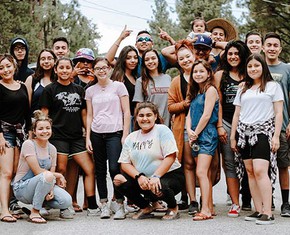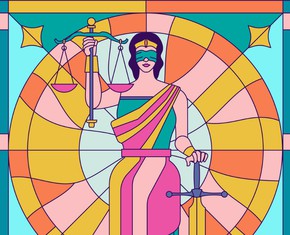The views expressed in our content reflect individual perspectives and do not represent the authoritative views of the Baha'i Faith.
As we live our lives we all grapple with the facts of our birth.
Some of us were born into stable prosperous societies, while others were born in the midst of catastrophic civil wars. Some of us came into neighborhoods with excellent schools, while many arrived in communities torn apart by exploitation and oppression. Some had family members with good jobs. Others were surrounded by relatives living hand-to-mouth, if they were even around at all.
Each life, each family, each situation presents unique challenges and opportunities to develop a person’s full human potential. Our choices determine patterns of living and ways of interacting with others that enable us to get by on a day-to-day basis. Those of us born into hardship have to figure out how to make the most of what little we have. Those of us born into privilege, like I was, have had to choose—whether consciously or unconsciously—what to do with the substantial liberty afforded us by the advantageous facts of our birth.
I don’t have the life experience to speak about dealing with hardship, so I won’t try. But I will share a few thoughts regarding the moral dilemmas of being well-off. It’s fairly easy for an affluent person to not become a thief or a murderer. But it can take a special effort, when material opportunity surrounds a person from a young age, to not become a complacent functionary within a corrupt society, doing little or nothing to improve the lot of those with less. That’s the dilemma I want to speak to here, even while I make no claim to having all the answers for how to do it.
It’s one thing to denounce privilege and want nothing to do with it. But it’s another matter entirely to accept that an individual can’t just throw away their unearned advantages and, by doing so, unravel the systemic injustice that created them. The excessive concentration of social power remains within oneself. We can’t deny the facts of our birth. So we have to consider how those facts can help us chart a life-course that serves the happiness and well-being of all people. For, as it says in the Baha’i teachings:
Is any larger bounty conceivable than this, that an individual, looking within himself, should find that by the confirming grace of God he has become the cause of peace and well-being, of happiness and advantage to his fellow men? No, by the one true God, there is no greater bliss, no more complete delight. – Abdu’l-Baha, The Secret of Divine Civilization, pp. 2-3.
This is not to say that privileged people using their privilege to help others is necessarily the optimal strategy for attaining justice in the world. The Earth’s multitudes should still be the authors of their own progress. It’s just saying that if someone has ample resources and the liberty to use them, then that person should accomplish as much good with it as possible. Privilege, then, becomes just a specific context for practicing the universal principle of love, even if abolishing that special advantage in comparison to others is a positive good that we need to pursue.
Consider the words of Abdu’l-Baha:
Therefore, order your lives in accordance with the first principle of the divine teaching, which is love. Service to humanity is service to God. Let the love and light of the Kingdom radiate through you until all who look upon you shall be illumined by its reflection. – Abdu’l-Baha, The Promulgation of Universal Peace, p. 8.
Love can happen spontaneously, but it becomes much deeper and more powerful when it is supported by our general lifestyle. We have to think consciously about how we organize our time, set priorities, and work towards long-term goals. Abdu’l-Baha talks about ordering our lives in accordance with love. As we give thought to our personal futures, we would do well to think about how the lifestyle we’re trying to live helps us to connect with others through love.
In my experience, one of the major obstacles to ordering one’s life around love is the impulse to preserve a high social or economic status in society. Inheriting the social position of one’s parents is not entirely automatic. It requires getting into the right schools, networking with the right people, carefully developing the qualifications for the career that will pay the kind of money that makes it all seem worth doing again for the next generation.
Many of these things are fine enough on their own. But taken together they can also crowd out more important matters, like developing true and authentic friendships with people who aren’t from those social circles, or giving oneself sacrificially to some greater social or spiritual cause. The best things in life have value in themselves, not just as a means to some self-interested material end.
In the history of the Baha’i Faith, one notable example of ordering one’s life around love comes from the young adulthood of Baha’u’llah and his wife Navvab. They were both born into powerful, well-off families of the Iranian upper class. But they didn’t seek to merely replicate what they grew up in. As one historian describes the lifestyle they lived in Tehran during the early years of their marriage:
The life of the capital city was of little interest to the couple, and they took small part in the reciprocal social events, state functions and luxurious living of their peers. They wasted no thought on retrieving their material advantages, however diminished, from Mirza Buzurg’s [Baha’u’llah’s father’s] former great wealth, preferring to devote themselves to charitable causes. Caring for the poor, the troubled and the unfortunate was their way of life … Their yet-considerable resources enabled them to aid many in that land of shameful wealth and grinding poverty. No one was turned away from their doors. – David Ruhe, Robe of Light, p. 51.
Baha’u’llah and his wife could have dedicated themselves to shoring up their position within the political elite—but instead they allowed love to shape their priorities and focus. They entwined themselves with the personal affairs of people who counted as next to nothing in the eyes of the rich. Baha’u’llah and Navvab made use of their privilege to make a difference in real people’s lives, regardless of whether or not their actions preserved their high status.
While that doesn’t necessarily mean that you, or I, or somebody else can or should do exactly what Baha’u’llah and Navvab did, it does provide a powerful counterpoint to the complacency and cynicism so often found among those of us who have been handed comfort and security through the facts of our birth. Baha’u’llah and Navvab’s example can inspire courage to explore what possibilities are in front of us when we order our lives to love.
















Comments
Sign in or create an account
Continue with Googleor